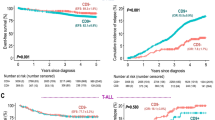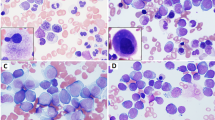Abstract
We have analyzed the expression of Tdt and CD7 in 335 cases of unequivocal acute myeloid leukemia (AML). Tdt was expressed in 80 (25%) of 321 evaluable cases. Twenty-six of 77 (34%) Tdt+ patients assessable for response, entered complete remission (CR) vs 121 of 209 (58%) Tdt− cases (P < 0.001). cd7 was expressed in 102 of 332 (30%) evaluable cases; 37 of 93 assessable (40%) cd7+ patients attained a CR as compared to 114/204 (56%) CD7− (P = 0.013). Duration of survival was significantly shorter for patients with CD7+ or Tdt+ AML (P = 0.006 and 0.001, respectively). In a multivariate analysis, Tdt was found to significantly adverse achievement of CR (P = 0.018), while CD7 affected duration of CR (P = 0.037). Overall the expression of either Tdt or CD7 correlated with a relatively high expression of CD34 (P < 0.001), gp-170 (P = 0.003), lymphoid antigens (LyAg) (P < 0.001), t(9;22) or anomalies of chromosome 5/7 (P < 0.001). finally, we pooled the patients into four phenotypic classes, according to the presence of tdt, cd7 or both: [tdt−CD7−], [Tdt+CD7−], [Tdt−CD7+] and [Tdt+CD7+]. The category [Tdt+CD7+] was characterized by a more unfavorable outcome as suggested by a lower rate of CR (P < 0.001) and a shorter duration of survival as compared to cases [tdt−CD7−], [Tdt+CD7−] and [Tdt−CD7+] (P = 0.002). This figure is consistent with the frequent convergence in the subset [Tdt+CD7+] of GP-170 positivity (P = 0.003), translocation t(9;22), anomalies of chromosome 5 and/or 7 (P < 0.001) and signs of lineage infidelity (deviant expression of lymphoid antigens) (P < 0.001). we conclude that the expression of tdt or cd7 is associated with an unfavorable outcome and that the combination of both defines a clinical subset with a poorer prognosis due to the significantly higher association with mdr phenotype, and ‘poor prognostic’ chromosomal abnormalities.
This is a preview of subscription content, access via your institution
Access options
Subscribe to this journal
Receive 12 print issues and online access
$259.00 per year
only $21.58 per issue
Buy this article
- Purchase on Springer Link
- Instant access to full article PDF
Prices may be subject to local taxes which are calculated during checkout
Similar content being viewed by others
Author information
Authors and Affiliations
Rights and permissions
About this article
Cite this article
Venditti, A., Poeta, G., Buccisano, F. et al. Prognostic relevance of the expression of Tdt and CD7 in 335 cases of acute myeloid leukemia. Leukemia 12, 1056–1063 (1998). https://doi.org/10.1038/sj.leu.2401067
Received:
Accepted:
Published:
Issue Date:
DOI: https://doi.org/10.1038/sj.leu.2401067
Keywords
This article is cited by
-
Naturally selected CD7 CAR-T therapy without genetic editing demonstrates significant antitumour efficacy against relapsed and refractory acute myeloid leukaemia (R/R-AML)
Journal of Translational Medicine (2022)
-
5q− syndrome-like features as the first manifestation of myelodysplastic syndrome in a patient with an unbalanced whole-arm translocation der(5;19)(p10;q10)
International Journal of Hematology (2017)
-
Twist as a new prognostic marker in hematological malignancies
Clinical and Translational Oncology (2016)
-
Flow cytometric maturity score as a novel prognostic parameter in patients with acute myeloid leukemia
Annals of Hematology (2015)
-
Prognostic implications of CD14 positivity in acute myeloid leukemia arising from myelodysplastic syndrome
International Journal of Hematology (2013)



